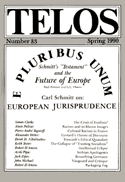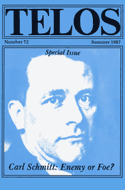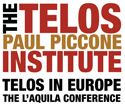By Telos Press · Wednesday, May 28, 2014 Just a reminder that the deadline for abstract submissions for this year’s Telos in Europe conference has been extended until June 15. If you plan to submit your paper for the conference, please be sure to email your abstract (no more than 250 words) to laquila@telosinstitute.net by that date, and place “L’Aquila 2014 conference” in the email’s subject line. For complete details about the conference, as well as the full call for papers, visit the conference page on the Telos-Paul Piccone Institute website.
Continue reading →
By Telos Press · Wednesday, April 2, 2014 At this year’s Telos Conference in New York City, Telos Associate Editor Adrian Pabst outlined the theme of the upcoming Telos in Europe Conference, which will be held on September 5–8, in L’Aquila, Italy. This conference will focus on “The Idea of Europe,” and will offer speakers and attendees an opportunity to discuss Europe’s current crisis of identity. For complete details about the conference, as well as the full call for papers, please visit the conference page on the Telos Paul Piccone Institute website, located here.
Continue reading →
By Artemy Magun · Tuesday, March 11, 2014 The ongoing take over of Crimea by Russia, and its intense political campaigning to annul the results of the Kiev revolution, took most observers of international politics by surprise. Normally, one has not been considering Russia as a serious contender of the United States for hegemony, as a country with serious economic or military resources, or even as a country with a particularly serious ideology. American and European political science has for decades been busy with “transitions to democracy” and the evaluation of their relative successes (even though there is a recent shift toward the study of authoritarianism), and in International Relations, China seemed to be the only possible opponent to U.S. unilateral hegemony. European Studies examines the various neighborhood policies of the European Union, measuring their relative success in “democratization.” The U.S. and European leaders therefore reacted to the events in Russia and Ukraine with surprise: John Kerry spoke of Russia’s “nineteenth-century behavior,” and Angela Merkel described Putin as being delusional, living “in another world.” This correctly describes the huge discrepancies in worldviews and values, but the views and values of Russian leadership, whether delusional or not, have very real effects, and therefore represent a repressed part of the reality about which the Western leaders do not want to think.
Continue reading →
By Linas Jokubaitis · Tuesday, February 18, 2014 As an occasional feature on TELOSscope, we highlight a past Telos article whose critical insights continue to illuminate our thinking and challenge our assumptions. Today, Linas Jokubaitis looks at Paul Piccone and Gary Ulmen’s “Schmitt’s ‘Testament’ and the Future of Europe” from Telos 83 (Spring 1990).
 When Schmitt drafted his lecture “The Plight of European Jurisprudence” in 1944, he had reasons to believe that it would be his last lecture. After a failed assassination attempt on Hitler, his friend Johannes Popitz was arrested as an important conspirator in the plot and was later put to death. This is why the article by Paul Piccone and Gary Ulmen on this lecture is called “Schmitt’s ‘Testament’ and the Future of Europe.” The lecture did not prove to be Schmitt’s last. The irony is that what Schmitt wrote as his own testament can today be read as a testament of Europe. The validity of this claim depends only on how one views the current state of Europe. When Schmitt drafted his lecture “The Plight of European Jurisprudence” in 1944, he had reasons to believe that it would be his last lecture. After a failed assassination attempt on Hitler, his friend Johannes Popitz was arrested as an important conspirator in the plot and was later put to death. This is why the article by Paul Piccone and Gary Ulmen on this lecture is called “Schmitt’s ‘Testament’ and the Future of Europe.” The lecture did not prove to be Schmitt’s last. The irony is that what Schmitt wrote as his own testament can today be read as a testament of Europe. The validity of this claim depends only on how one views the current state of Europe.
Continue reading →
By Linas Jokubaitis · Tuesday, January 28, 2014 As an occasional feature on TELOSscope, we highlight a past Telos article whose critical insights continue to illuminate our thinking and challenge our assumptions. Today, Linas Jokubaitis looks at Carl Schmitt’s “The Legal World Revolution” from Telos 72 (Summer 1987).
 Carl Schmitt wrote “The Legal World Revolution” when he was ninety years old, and it turned out to have been his last publication. New political developments had forced him to restate some of his old positions, the most important of which was the relationship between legitimacy, legality, and super-legality. The guiding theme of Schmitt’s final publication was the one that had been of the highest importance during his whole career. It is best summarized in notes posthumously published as Glossarium, in a passage entitled “The Diagnostic and Prognostic of Max Weber,” where Schmitt quoted from Weber’s “Sociology of Law”: “As a result of technical and economic development, it is inevitable that current law is destined to be conceived more and more as a rational technical mechanism which can be modified at any time for functional purposes, and is lacking in any kind of sacred content. The destiny may be hidden by the suppleness of belief of the current law, but cannot be truly avoided.” Carl Schmitt wrote “The Legal World Revolution” when he was ninety years old, and it turned out to have been his last publication. New political developments had forced him to restate some of his old positions, the most important of which was the relationship between legitimacy, legality, and super-legality. The guiding theme of Schmitt’s final publication was the one that had been of the highest importance during his whole career. It is best summarized in notes posthumously published as Glossarium, in a passage entitled “The Diagnostic and Prognostic of Max Weber,” where Schmitt quoted from Weber’s “Sociology of Law”: “As a result of technical and economic development, it is inevitable that current law is destined to be conceived more and more as a rational technical mechanism which can be modified at any time for functional purposes, and is lacking in any kind of sacred content. The destiny may be hidden by the suppleness of belief of the current law, but cannot be truly avoided.”
Continue reading →
By Telos Press · Wednesday, December 4, 2013  The Telos-Paul Piccone Institute is pleased to announce its second biennial colloquium in L’Aquila, Italy. The theme of the conference will be “The Idea of Europe.” A full description of the conference, as well as the call for papers, is available on the Institute’s website. The Telos-Paul Piccone Institute is pleased to announce its second biennial colloquium in L’Aquila, Italy. The theme of the conference will be “The Idea of Europe.” A full description of the conference, as well as the call for papers, is available on the Institute’s website.
Continue reading →
|
|
 When Schmitt drafted his lecture “The Plight of European Jurisprudence” in 1944, he had reasons to believe that it would be his last lecture. After a failed assassination attempt on Hitler, his friend Johannes Popitz was arrested as an important conspirator in the plot and was later put to death. This is why the article by Paul Piccone and Gary Ulmen on this lecture is called “Schmitt’s ‘Testament’ and the Future of Europe.” The lecture did not prove to be Schmitt’s last. The irony is that what Schmitt wrote as his own testament can today be read as a testament of Europe. The validity of this claim depends only on how one views the current state of Europe.
When Schmitt drafted his lecture “The Plight of European Jurisprudence” in 1944, he had reasons to believe that it would be his last lecture. After a failed assassination attempt on Hitler, his friend Johannes Popitz was arrested as an important conspirator in the plot and was later put to death. This is why the article by Paul Piccone and Gary Ulmen on this lecture is called “Schmitt’s ‘Testament’ and the Future of Europe.” The lecture did not prove to be Schmitt’s last. The irony is that what Schmitt wrote as his own testament can today be read as a testament of Europe. The validity of this claim depends only on how one views the current state of Europe.  Carl Schmitt wrote “The Legal World Revolution” when he was ninety years old, and it turned out to have been his last publication. New political developments had forced him to restate some of his old positions, the most important of which was the relationship between legitimacy, legality, and super-legality. The guiding theme of Schmitt’s final publication was the one that had been of the highest importance during his whole career. It is best summarized in notes posthumously published as Glossarium, in a passage entitled “The Diagnostic and Prognostic of Max Weber,” where Schmitt quoted from Weber’s “Sociology of Law”: “As a result of technical and economic development, it is inevitable that current law is destined to be conceived more and more as a rational technical mechanism which can be modified at any time for functional purposes, and is lacking in any kind of sacred content. The destiny may be hidden by the suppleness of belief of the current law, but cannot be truly avoided.”
Carl Schmitt wrote “The Legal World Revolution” when he was ninety years old, and it turned out to have been his last publication. New political developments had forced him to restate some of his old positions, the most important of which was the relationship between legitimacy, legality, and super-legality. The guiding theme of Schmitt’s final publication was the one that had been of the highest importance during his whole career. It is best summarized in notes posthumously published as Glossarium, in a passage entitled “The Diagnostic and Prognostic of Max Weber,” where Schmitt quoted from Weber’s “Sociology of Law”: “As a result of technical and economic development, it is inevitable that current law is destined to be conceived more and more as a rational technical mechanism which can be modified at any time for functional purposes, and is lacking in any kind of sacred content. The destiny may be hidden by the suppleness of belief of the current law, but cannot be truly avoided.”  The Telos-Paul Piccone Institute is pleased to announce its second biennial colloquium in L’Aquila, Italy. The theme of the conference will be
The Telos-Paul Piccone Institute is pleased to announce its second biennial colloquium in L’Aquila, Italy. The theme of the conference will be 

